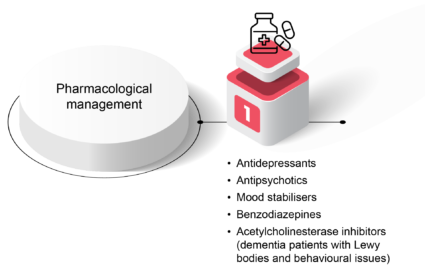
Health Resources
- Home
- Health Resources
- Mild Cognitive Impairment vs. Dementia
Mild Cognitive Impairment vs. Dementia

Mild Cognitive Impairment vs. Dementia
What Is MCI?
Mild cognitive impairment is a middle stage between normal ageing and dementia. While it is a helpful concept, MCI can be hard to define and diagnose.1
What Is Dementia?
Dementia is a specific medical condition characterised by symptoms such as difficulty remembering, thinking, or making decisions, which can significantly impact one’s daily life. The most common type of dementia is Alzheimer’s disease. While dementia mostly affects older people, it is not a normal part of getting older.2
The table below highlights the key differences between MCI and dementia. 3
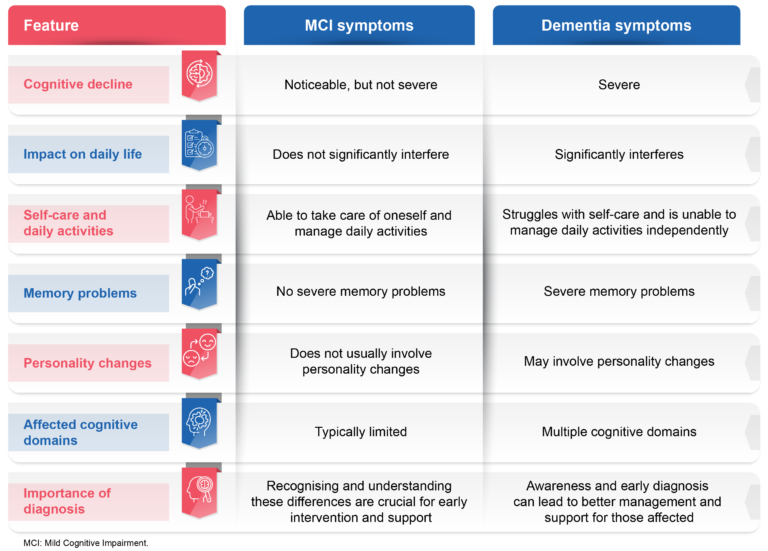
Prevalence of MCI and Dementia in Singapore
As Singapore’s population ages, the challenge of dementia is growing. The number of residents aged 65 years and older went up from 9% in 2010 to 14.4% in 2019 and is expected to reach about 19% by 2030. This increase shows how important it is to focus on cognitive health in older adults.4
Types of Dementia
There are several types of dementia, each with distinct characteristics. Here are some common ones: 5
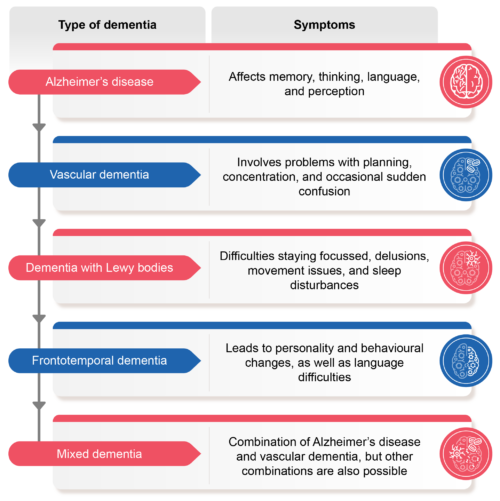
Signs and Symptoms of Dementia
Signs that may point to dementia include the following:2
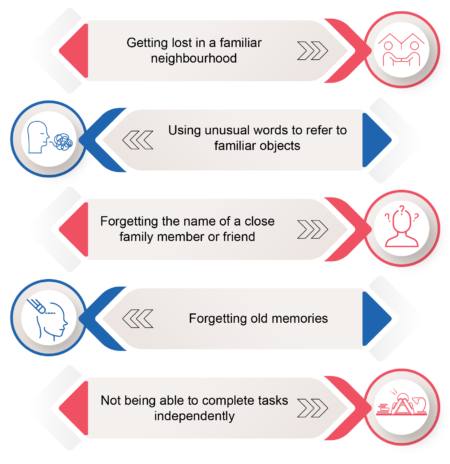
Because dementia is broad, symptoms can vary widely. People with dementia may have difficulties, including the following:2
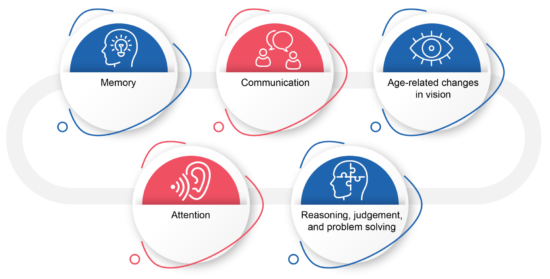
Risk Factors Associated With MCI and Dementia
The risk factors associated with MCI and dementia include the following:6-8
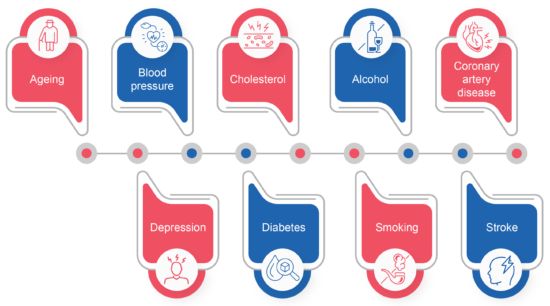
Diagnosis and Evaluation of Dementia and MCI
Consider a dementia evaluation if you (or a loved one) have memory issues, if a doctor suspects cognitive impairment, or if there is a family history of dementia and important decisions need to be made.9
For a person with forgetfulness or confusion, the doctor would use a four-step assessment to evaluate the cognitive complaint, as shown below:9
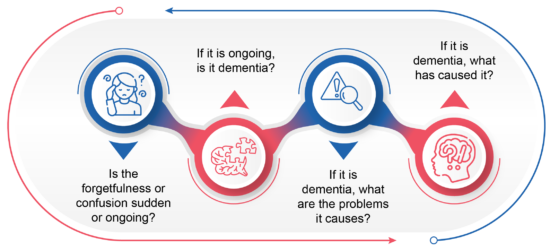
An observer-based approach, such as a brief mental status test or more detailed neuropsychological tests, can be administered by your clinical psychologists.9
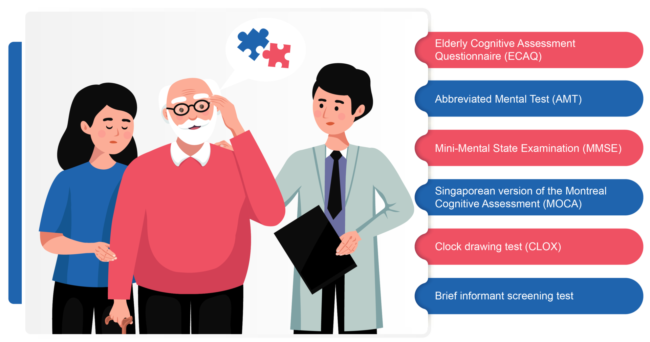
Assessing the Complications of Dementia
The complications of dementia include behavioural and psychological symptoms, functional issues, and social challenges. Evaluating these factors in all individuals with dementia is crucial, as they place significant stress on caregivers. Proper assessment is key to achieving effective management of the condition.9
Doctors can diagnose dementia and MCI by reviewing your medical history, conducting an examination, and using standard assessments like those in the Diagnostic and Statistical Manual of Mental Disorders-5th edition (DSM-5) criteria, as shown in the table below:10
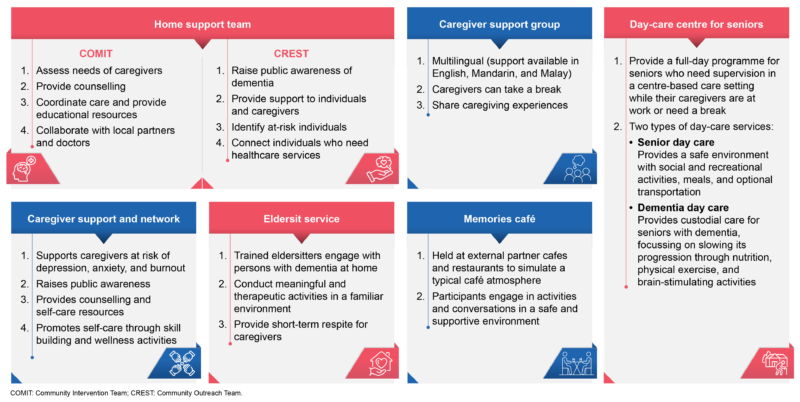
Determining the Cause of Dementia
Once chronic cognitive impairment meets dementia criteria and complications are assessed, the final step is determining the cause of dementia.
Types of dementia can be broadly categorised into two groups. Dementia occurs due to
- Irreversible causes
- Reversible causes
Figuring out the cause helps rule out factors that can be fixed and also helps in choosing the right treatments for dementia that cannot be fixed. This can be done via the following:9
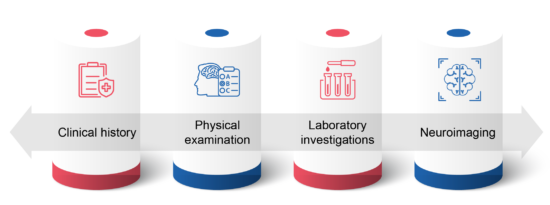
Coping Strategies and Support for Patients and Families
People with dementia may see the world differently than others. To help them, try to understand their viewpoint and notice how they deal with challenges. Recognising their coping methods can make it easier to support them. The following are some coping strategies people with dementia might use to manage their daily life:12

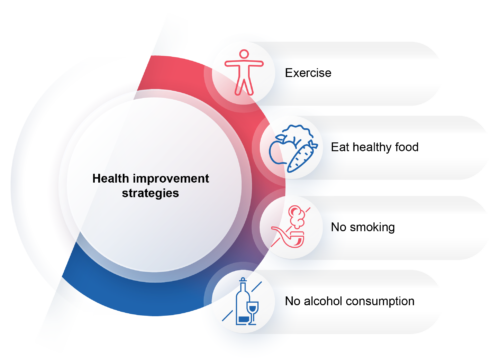
The following are the various caregiver support services available in Singapore:13,14


References
1. Petersen RC. Mild cognitive impairment. Continuum (Minneap Minn).
2016;22:404–418.
2. What Is dementia? | CDC. Available at: https://www.cdc.gov/alzheimers-dementia/about/ Accessed on: 18 July 2024.
3. Knopman DS, Petersen RC. Mild cognitive impairment and mild dementia: A clinical perspective. Mayo Clin Proc. 2014;89:1452–1459.
4. Teh WL, Abdin E, Vaingankar JA, et al. Prevalence, lifestyle correlates, and psychosocial functioning among multi-ethnic older adults with mild cognitive impairment in Singapore: Preliminary findings from a 10/66 population study. Yale J Biol Med. 2021;94:73–83.
5. Understanding different types of dementia. National Institute on Aging. Available at: https://www.nia.nih.gov/health/alzheimers-and-dementia/understanding-different-types-dementia. Accessed on: 18 July 2024.
6. Anand S, Schoo C. Mild cognitive impairment. In: StatPearls. Treasure Island (FL): StatPearls Publishing. Available at: http://www.ncbi.nlm.nih.gov/books/NBK599514/. Accessed on: 18 July 2024.
7. Ganguli M, Fu B, Snitz BE, et al. Mild cognitive impairment: Incidence and vascular risk factors in a population-based cohort. Neurology. 2013;80:2112–2120.
8. Sachdev PS, Lipnicki DM, Crawford J, et al. Risk profiles for mild cognitive impairment vary by age and sex: The Sydney Memory and Ageing study. Am J Geriatr Psychiatry. 2012;20:854–865.
9. Making the diagnosis of dementia.pdf. Available at: https://www.cfps.org.sg/publications/the-singapore-family-physician/article/372_pdf. Accessed on: 18 July 2024.
10. Hugo J, Ganguli M. Dementia and cognitive impairment: Epidemiology, diagnosis, and treatment. Clin Geriatr Med. 2014;30:421–442.
11. Ministry of Health Singapore. Dementia. MOH Clinical Practice Guidelines 1/2013. Available at: https://www.moh.gov.sg/docs/librariesprovider4/guidelines/dementia-10-jul-2013—booklet.pdf. Accessed on: 18 July 2024.
12. Understanding and supporting a person with dementia | Alzheimer’s Society. Available at: https://www.alzheimers.org.uk/get-support/help-dementia-care/understanding-supporting-person-dementia. Accessed on: 18 July 2024.
13. Caregiver Support Services – Dementia Singapore. Available at: https://dementia.org.sg/css/. Accessed on: 18 July 2024.
14. Day Care Centres (Senior & Dementia). Care Corner Singapore l. Available at: https://www.carecorner.org.sg/services/day-care-centres-senior-dementia/. Accessed on: 29 July 2024.


